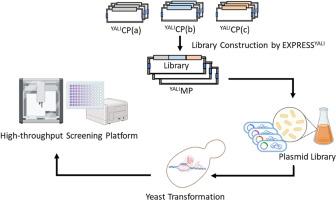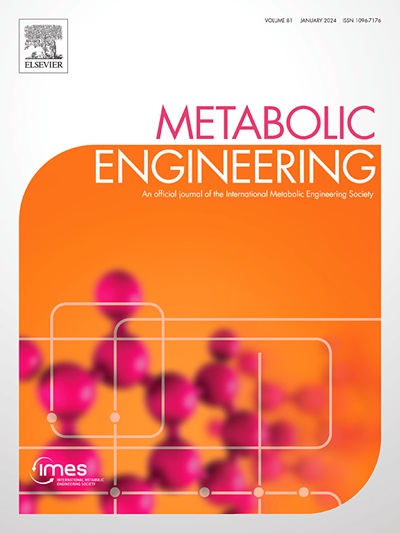Yarrowia lipolytica 代谢工程的组合迭代法:在甜菜宁生物合成中的应用。
IF 6.8
1区 生物学
Q1 BIOTECHNOLOGY & APPLIED MICROBIOLOGY
引用次数: 0
摘要
基于组合库的代谢工程方法可以降低成本,加快菌株开发。我们开发了一个基因工具箱 EXPRESSYALI,用于油脂酵母 Yarrowia lipolytica 的组合工程。该工具箱可实现连续多轮工程,每轮可在每个酵母克隆中整合多达三个组合基因表达盒。如果需要同时敲除基因,这些基因盒可整合到不同的基因间位点或目标基因的开放阅读框中。我们通过六轮连续的基因组编辑和筛选,优化了脂溶性酵母生产红甜菜色素 betanin 的能力,从而展示了该工具箱的应用。文库大小在 24-360 个之间。文库筛选通过基于颜色的自动菌落挑选来实现。在第一轮中,整合了甜菜苷途径基因,使甜菜苷滴度达到约 20 毫克/升。在随后的连续五轮筛选中,整合了更多的生物合成基因,并优化了前体供应,结果滴度达到 70 毫克/升。为了防止甜菜宁脱糖,删除了三个β-葡萄糖苷酶,从而使甜菜宁的小规模滴度达到 130 毫克/升,而在饲料批量生物反应器中的滴度为 1.4 克/升。EXPRESSYALI 工具箱可促进脂溶性酵母的代谢工程(可通过 AddGene Cat Nr.)本文章由计算机程序翻译,如有差异,请以英文原文为准。

Combinatorial iterative method for metabolic engineering of Yarrowia lipolytica: Application for betanin biosynthesis
Combinatorial library-based metabolic engineering approaches allow lower cost and faster strain development. We developed a genetic toolbox EXPRESSYALI for combinatorial engineering of the oleaginous yeast Yarrowia lipolytica. The toolbox enables consecutive rounds of engineering, where up to three combinatorially assembled gene expression cassettes can be integrated into each yeast clone per round. The cassettes are integrated into distinct intergenic sites or an open reading frame of a target gene if a simultaneous gene knockout is desired. We demonstrate the application of the toolbox by optimizing the Y. lipolytica to produce the red beet color betanin via six consecutive rounds of genome editing and screening. The library size varied between 24 and 360. Library screening was facilitated by automated color-based colony picking. In the first round, betanin pathway genes were integrated, resulting in betanin titer of around 20 mg/L. Through the following five consecutive rounds, additional biosynthetic genes were integrated, and the precursor supply was optimized, resulting in a titer of 70 mg/L. Three beta-glucosidases were deleted to prevent betanin deglycosylation, which led to a betanin titer of 130 mg/L in a small scale and a titer of 1.4 g/L in fed-batch bioreactors. The EXPRESSYALI toolbox can facilitate metabolic engineering efforts in Y. lipolytica (available via AddGene Cat. Nr. 212682–212704, Addgene kit ID # 1000000245).
求助全文
通过发布文献求助,成功后即可免费获取论文全文。
去求助
来源期刊

Metabolic engineering
工程技术-生物工程与应用微生物
CiteScore
15.60
自引率
6.00%
发文量
140
审稿时长
44 days
期刊介绍:
Metabolic Engineering (MBE) is a journal that focuses on publishing original research papers on the directed modulation of metabolic pathways for metabolite overproduction or the enhancement of cellular properties. It welcomes papers that describe the engineering of native pathways and the synthesis of heterologous pathways to convert microorganisms into microbial cell factories. The journal covers experimental, computational, and modeling approaches for understanding metabolic pathways and manipulating them through genetic, media, or environmental means. Effective exploration of metabolic pathways necessitates the use of molecular biology and biochemistry methods, as well as engineering techniques for modeling and data analysis. MBE serves as a platform for interdisciplinary research in fields such as biochemistry, molecular biology, applied microbiology, cellular physiology, cellular nutrition in health and disease, and biochemical engineering. The journal publishes various types of papers, including original research papers and review papers. It is indexed and abstracted in databases such as Scopus, Embase, EMBiology, Current Contents - Life Sciences and Clinical Medicine, Science Citation Index, PubMed/Medline, CAS and Biotechnology Citation Index.
 求助内容:
求助内容: 应助结果提醒方式:
应助结果提醒方式:


